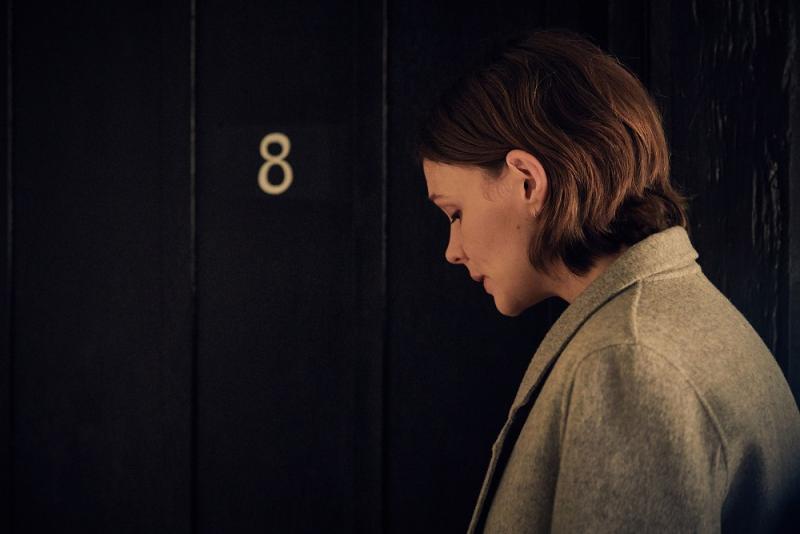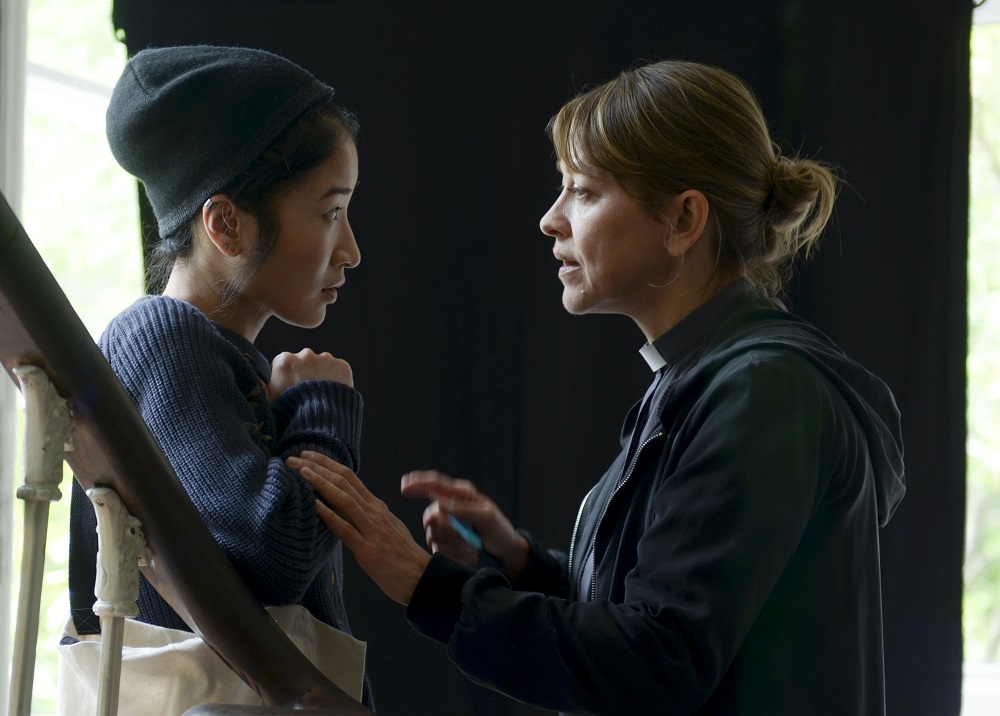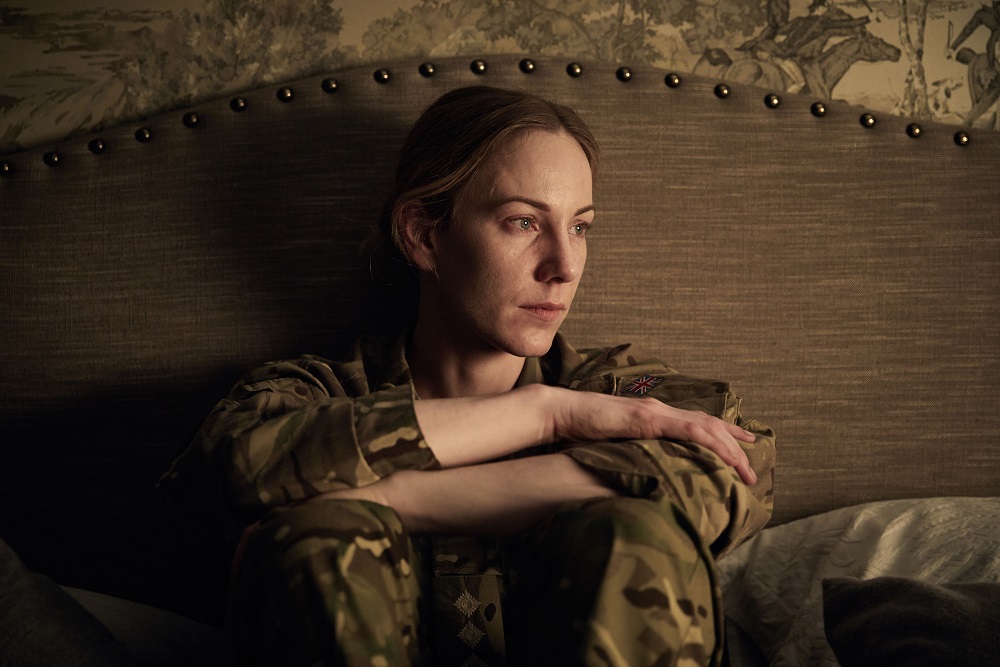Collateral, series finale, BBC Two - Carey Mulligan hares to the finish | reviews, news & interviews
Collateral, series finale, BBC Two - Carey Mulligan hares to the finish
Collateral, series finale, BBC Two - Carey Mulligan hares to the finish
David Hare's state-of-the-nation procedural totters under the weight of its own ambition

In a revelatory interview for the Royal Court’s playwright’s podcast series, David Hare admits to a thin skin. In his adversarial worldview, to take issue with him is – his word – to denounce him. He’s quite a denouncer himself, of course.
One, the playwright in him was unable to repress an instinct for planting his own thought bubbles in the mouths of his characters, who ended up sounding like him. An illegal immigrant or an asylum seeker or an MI5 apparatchik or a chippy detective or a posh addict might spout whingey op-eds or incandescent tweets about the state of the nation. In the third episode, to take one trivial example, an elderly disabled woman in a council flat complained of not being able to get through to social services on the phone: “two hours of Johann Strauss,” she moaned. She’d have no more cracked this urbane witticism, with its implied derision for Vienna's schmaltzy waltzes, than earned selection for the Zambian trampoline squad.
Two, in the first episode there was a motorway pile-up of coincidences which placed the ex of a rebel Labour MP, and the current girlfriend of another of his exes, at the scene of the murder of an Iraqi asylum seeker in a quiet London street. As a way of gathering in the loose strands of Hare’s ticklist of hot-button themes, this felt ungainly enough to start with. What became even more perplexing by the final episode was that these elements had virtually nothing to do with the main plot except to act as illustration slides in a lecture. (Pictured below: Kae Alexander and Nicola Walker). Three, Carey Mulligan. Carey Mulligan as an ex-Olympic pole vaulter is a leap of faith. Carey Mulligan as a hard-bitten detective inspector is a zero-gravity moon jump. DI Kip Glaspie – weird name, but then TV dramas have to call coppers names that aren’t shared with real coppers – marched from interview to crime scene to meeting armed with a knowing quip to bung back over her shoulder for absolutely every occasion. Being idealistic and highly intelligent, wanting to “put something right”, she was in effect David Hare in drag pole-vaulting over a high bar and into the bosom of the Met. “Somehow I felt I had authorisation,” she said to her boss (Ben Miles) who accused her of insubordinately offering asylum to an Iraqi witness. “I discerned it – it was in the air.” Spoken like an untrue detective.
Three, Carey Mulligan. Carey Mulligan as an ex-Olympic pole vaulter is a leap of faith. Carey Mulligan as a hard-bitten detective inspector is a zero-gravity moon jump. DI Kip Glaspie – weird name, but then TV dramas have to call coppers names that aren’t shared with real coppers – marched from interview to crime scene to meeting armed with a knowing quip to bung back over her shoulder for absolutely every occasion. Being idealistic and highly intelligent, wanting to “put something right”, she was in effect David Hare in drag pole-vaulting over a high bar and into the bosom of the Met. “Somehow I felt I had authorisation,” she said to her boss (Ben Miles) who accused her of insubordinately offering asylum to an Iraqi witness. “I discerned it – it was in the air.” Spoken like an untrue detective.
And yet the final episode did manage to hit a high gear and roar towards the finish as the police closed in on the traffickers, accidentally blew the cover of MI5’s mole, and bore down on the murderer, who administered her own retribution. There was a great intricacy of bluffing and blackmailing, not all of it in the upstairs café at Tate Britain. Kip’s interview with Berna (Maya Sansa) had a genuine whiff of actual cordite, plus a recommendation that we all watch more Turkish art house movies. There was also much to savour in the placard-waving ideological face-off between Simm’s maverick backbencher David Mars and Saskia Reeves as ballbreaking party leader Deborah Clifford, who revealed a flair for an equestrian metaphor: “I’m riding a horse that’s been shot through the legs," she said, "and I’ll do anything to get it up and running again.”
There was contagious talk of systems. “The system’s beaten me, truly,” said Rev Jane Oliver (Nicola Walker, very moving). “Isn’t that the point of systems?” asked Mars's assistant (Jacqueline Boatswain). “To outwit them?” Knotted-up and inward-facing, both the Church of England and the Labour Party, those former guarantors of civic compassion, were both shown to be suffering from systemic paralysis, albeit not particularly in relation to the main plot. And then there was the army. Into the character of Captain Sandrine Shaw (Jeany Spark, pictured above), whose unwarranted nude scene was meant to symbolise her being stripped of all illusions, Hare loaded his thoughts about the tragedy of our military, dishonoured by its adventures in Afghanistan and Iraq and now preying on its own. (Robert Portal was chilling as Shaw’s very superior officer). “I regret not being good,” she wrote by way of valediction. Her blood dripped down wallpaper illustrating, for extra irony, a traditional British blood sport. However bankrupt an institution, the army would definitely have informed Sandrine’s mother in person.
And then there was the army. Into the character of Captain Sandrine Shaw (Jeany Spark, pictured above), whose unwarranted nude scene was meant to symbolise her being stripped of all illusions, Hare loaded his thoughts about the tragedy of our military, dishonoured by its adventures in Afghanistan and Iraq and now preying on its own. (Robert Portal was chilling as Shaw’s very superior officer). “I regret not being good,” she wrote by way of valediction. Her blood dripped down wallpaper illustrating, for extra irony, a traditional British blood sport. However bankrupt an institution, the army would definitely have informed Sandrine’s mother in person.
The excellent acting piled on the flesh. In the end Collateral, a drama about damage, asked us to think about who gets to live in the UK, to be born in it, to die for it, and to kill for it. And of course, which slippery cynics get to run away from it when the shit hits the fan. It was probably too much to think about in four hours. This was Hare’s cluttered civics class lecture, addressed to whom it may concern. Lesson one: always check your email trail.
rating
Share this article
Add comment
The future of Arts Journalism
You can stop theartsdesk.com closing!
We urgently need financing to survive. Our fundraising drive has thus far raised £33,000 but we need to reach £100,000 or we will be forced to close. Please contribute here: https://gofund.me/c3f6033d
And if you can forward this information to anyone who might assist, we’d be grateful.

Subscribe to theartsdesk.com
Thank you for continuing to read our work on theartsdesk.com. For unlimited access to every article in its entirety, including our archive of more than 15,000 pieces, we're asking for £5 per month or £40 per year. We feel it's a very good deal, and hope you do too.
To take a subscription now simply click here.
And if you're looking for that extra gift for a friend or family member, why not treat them to a theartsdesk.com gift subscription?
more TV
 10 Questions for Mark Gatiss, writer-director of 'A Ghost Story for Christmas: Woman of Stone'
Gatiss explains why his eerie nested tale begins with its original Victorian-Edwardian author Edith Nesbit
10 Questions for Mark Gatiss, writer-director of 'A Ghost Story for Christmas: Woman of Stone'
Gatiss explains why his eerie nested tale begins with its original Victorian-Edwardian author Edith Nesbit
 All Creatures Great and Small, Christmas Special, Channel 5 review - Mrs Hall steps into the spotlight
Everyday saga of Yorkshire vets does exactly what it says on the tin
All Creatures Great and Small, Christmas Special, Channel 5 review - Mrs Hall steps into the spotlight
Everyday saga of Yorkshire vets does exactly what it says on the tin
 Death in Paradise Christmas Special, BBC One review - who killed Santa Claus?
Don Gilet steps into the detective's shoes on the island of Saint Marie
Death in Paradise Christmas Special, BBC One review - who killed Santa Claus?
Don Gilet steps into the detective's shoes on the island of Saint Marie
 Strike: The Ink Black Heart, BBC One review - protracted, convoluted puzzler lifted by its leads
The army veteran and his partner are still trapped in a detective-genre script
Strike: The Ink Black Heart, BBC One review - protracted, convoluted puzzler lifted by its leads
The army veteran and his partner are still trapped in a detective-genre script
 Black Doves, Netflix review - Keira Knightley and Ben Whishaw battle against the implausible
Can anyone be trusted in Joe Barton's twisty London drama?
Black Doves, Netflix review - Keira Knightley and Ben Whishaw battle against the implausible
Can anyone be trusted in Joe Barton's twisty London drama?
 Senna, Netflix review - the life and legend of Brazil's greatest driver
You saw the movie, now watch the TV series
Senna, Netflix review - the life and legend of Brazil's greatest driver
You saw the movie, now watch the TV series
 Landman, Paramount+ review - once upon a time in the West
Billy Bob Thornton stars in Taylor Sheridan's Texas oil drama
Landman, Paramount+ review - once upon a time in the West
Billy Bob Thornton stars in Taylor Sheridan's Texas oil drama
 Paris Has Fallen, Prime Video review - Afghan war veteran wreaks a terrible vengeance
Cynical politicians and amoral arms dealers feel the heat
Paris Has Fallen, Prime Video review - Afghan war veteran wreaks a terrible vengeance
Cynical politicians and amoral arms dealers feel the heat
 Wolf Hall: The Mirror and the Light, BBC One review - handsome finale for Hilary Mantel adaptation
Mark Rylance is on top form as his Thomas Cromwell re-emerges after nine years
Wolf Hall: The Mirror and the Light, BBC One review - handsome finale for Hilary Mantel adaptation
Mark Rylance is on top form as his Thomas Cromwell re-emerges after nine years
 The Day of the Jackal, Sky Atlantic review - Frederick Forsyth's assassin gets a modern-day makeover
Eddie Redmayne shoots to kill in lavish 10-part drama
The Day of the Jackal, Sky Atlantic review - Frederick Forsyth's assassin gets a modern-day makeover
Eddie Redmayne shoots to kill in lavish 10-part drama
 Road Diary: Bruce Springsteen and the E Street Band, Disney+ review - the Boss grows older defiantly
Thom Zimny's film reels in 50 years of New Jersey's most famous export
Road Diary: Bruce Springsteen and the E Street Band, Disney+ review - the Boss grows older defiantly
Thom Zimny's film reels in 50 years of New Jersey's most famous export

Comments
Your 'deconstructionist'
I do prefer Howard Brenton in